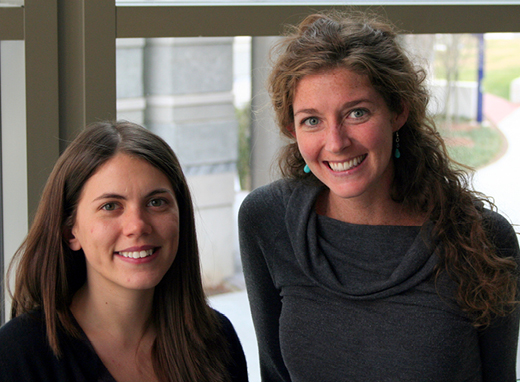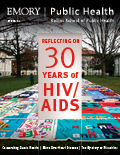Humanitarians at heart
 Sally Embrey (left) has worked to stop lead poisoning of children in Nigeria, while Rebecca Egner has advised women refugees near Atlanta on business practices.
Sally Embrey (left) has worked to stop lead poisoning of children in Nigeria, while Rebecca Egner has advised women refugees near Atlanta on business practices.
Students recognized for service to others
MPH students Rebecca Egner and Sally Embrey are among six Emory students who received 2011 Humanitarian Awards this spring. Both students exemplify community service, locally and globally.
Sewing good deeds
For Rebecca Egner, participating in Rollins’ Peace Corps Fellowship Program for returned volunteers was more than an opportunity to give back to the Atlanta community in the same way she had served in Burkina Faso. It inspired her to think of creative ways to apply the knowledge she gained in West Africa to U.S. communities in need.
At Rollins, she has volunteered with the Refugee Sewing Society in Clarkston, Georgia, where hundreds of refugees live. At the Clarkston Community Center, nearly 40 women, many of whom have escaped war and lost loved ones to violence, use the creative arts for fellowship, work, and healing. They gather weekly to make handbags, scarves, and jewelry to sell. Egner, who advises the society, negotiated with Emory’s Barnes & Noble bookstore to sell their handmade items on campus.
This past year, Egner also assisted Bhutanese refugees who needed health services in Atlanta. She helped connect more than 200 refugees with the Grady Health System. Without her help, the refugees—who often don’t speak English—would have little ability to navigate the U.S. health care system and receive critical health services.
“Rollins has been a perfect match for me because it allows me to combine everything I love—public health, global involvement, microenterprise for women, and health services—all in one setting,” says Egner.
Her experience with the refugee community helped her discover her true calling—public health nursing. She has applied to several nursing schools, including Emory’s. Before she enters the next phase of her journey, Egner will graduate with the seven students she has mentored in the Masters International Program, which prepares students for Peace Corps service. At graduation, each student will wear a Peace Corps stole made by the Refugee Sewing Society.
“For me,” Egner says, “the Peace Corps was the inspiration for expanding the possibilities of not only what I could accomplish in the community, but also what I could achieve in my education and career.”—Tarvis E. Thompson
Abating Nigeria’s lead crisis
In a village in northern Nigeria, the sounds of children playing outside had grown quieter. Out of 227 children, only 150 were left.
Personnel from Doctors Without Borders/Médecins Sans Frontières (MSF) first noticed the missing children in early 2010 after looking at the meningitis vaccination records they kept on the children. When doctors asked about the difference in their head count, village elders took them to see the dozens of graves they had dug outside the village. MSF contacted the Nigerian Ministry of Health, who called the United Nations, the CDC, and several nongovernmental organizations (NGOs) to determine why the children had died.
The culprit was lead poisoning. The village’s subsistence farmers found gold mining to be a lucrative trade and in order to make more money, they turned processing of the mined ore over to their wives. At home, the women pulverized the ore into powder, washed and dried it, and then mixed it with mercury to extract the gold. The dust created by the process poisoned their children and contaminated the soil.
Blacksmith Institute, the NGO tapped to remediate the soil, asked Sally Embrey to assist. Last year, Embrey worked in villages to oversee removal of contaminated soil and creation of a landfill in which to bury it. She coordinated crews of up to 60 villagers and government workers to remove the top layer of soil from each home. Workers bagged and transported the contaminated soil to the landfill and then brought in fresh soil to place in homes.
“Nigeria has put a ban on mining before, but it’s hard to stop,” says Embrey. “Ore processing in homes still goes on, but we have to be culturally sensitive. We don’t know what will happen after our emergency efforts end. It’s the missing piece.”
How cultural and social norms affect emergency efforts intrigues Embrey. She plans to pursue a doctorate in environmental health after she graduates from Rollins in May.—Kay Torrance


